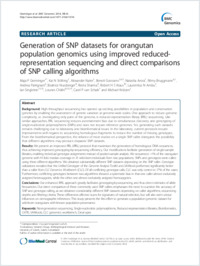Generation of SNP datasets for orangutan population genomics using improved reduced-representation sequencing and direct comparisons of SNP calling algorithms
Université de Fribourg
- Greminger, Maja P. Evolutionary Genetics Group, Anthropological Institute and Museum, University of Zurich, Switzerland
- Stölting, Kai N. Unit of Ecology & Evolution, Department of Biology, University of Fribourg, Switzerland
- Nater, Alexander Evolutionary Genetics Group, Anthropological Institute and Museum, University of Zurich, Switzerland
- Goossens, Benoit Organisms and Environment Division, School of Biosciences, Cardiff University, Cardiff, UK - Danau Girang Field Centre, c/o Sabah Wildlife Department, Kota Kinabalu, Sabah, Malaysia - Sabah Wildlife Department, Kota Kinabalu, Sabah, Malaysia
- Arora, Natasha Evolutionary Genetics Group, Anthropological Institute and Museum, University of Zurich, Switzerland
- Bruggmann, Rémy Functional Genomics Center, University of Zurich, Switzerland - Department of Biology, University of Berne, Switzerland
- Patrignani, Andrea Functional Genomics Center, University of Zurich, Switzerland
- Nussberger, Beatrice Institute of Evolutionary Biology and Environmental Studies, University of Zurich, Switzerland
- Sharma, Reeta Population and Conservation Genetics, Instituto Gulbenkian de Ciencia, Oeiras, Portugal
- Kraus, Robert H. S. Conservation Genetics Group, Senckenberg Research Institute and Natural History Museum, Gelnhausen, Germany
- Ambu, Laurentius N. Sabah Wildlife Department, Kota Kinabalu, Sabah, Malaysia
- Singleton, Ian Foundation for a Sustainable Ecosystem (YEL), Medan, Indonesia - PanEco, Foundation for Sustainable Development and Intercultural Exchange, Berg am Irchel, Switzerland
- Chikhi, Lounes CNRS, Laboratoire Evolution and Diversité Biologique, Université Paul Sabatier, Toulouse, France - Université de Toulouse, France - Population and Conservation Genetics, Instituto Gulbenkian de Ciencia, Oeiras, Portugal
- Schaik, Carel P. van Evolutionary Genetics Group, Anthropological Institute and Museum, University of Zurich, Switzerland
- Krützen, Michael Evolutionary Genetics Group, Anthropological Institute and Museum, University of Zurich, Switzerland
-
10.01.2014
Published in:
- BMC Genomics. - 2014, vol. 15, no. 1, p. 16
Next generation sequencing
Single nucleotide polymorphisms
Reduced representation libraries
Bioinformatics
GATK
SAMtools
CLC genomics workbench
Great apes
English
Background: High-throughput sequencing has opened up exciting possibilities in population and conservation genetics by enabling the assessment of genetic variation at genome-wide scales. One approach to reduce genome complexity, i.e. investigating only parts of the genome, is reduced-representation library (RRL) sequencing. Like similar approaches, RRL sequencing reduces ascertainment bias due to simultaneous discovery and genotyping of single-nucleotide polymorphisms (SNPs) and does not require reference genomes. Yet, generating such datasets remains challenging due to laboratory and bioinformatical issues. In the laboratory, current protocols require improvements with regards to sequencing homologous fragments to reduce the number of missing genotypes. From the bioinformatical perspective, the reliance of most studies on a single SNP caller disregards the possibility that different algorithms may produce disparate SNP datasets.Results: We present an improved RRL (iRRL) protocol that maximizes the generation of homologous DNA sequences, thus achieving improved genotyping-by-sequencing efficiency. Our modifications facilitate generation of single-sample libraries, enabling individual genotype assignments instead of pooled-sample analysis. We sequenced ~1% of the orangutan genome with 41-fold median coverage in 31 wild-born individuals from two populations. SNPs and genotypes were called using three different algorithms. We obtained substantially different SNP datasets depending on the SNP caller. Genotype validations revealed that the Unified Genotyper of the Genome Analysis Toolkit and SAMtools performed significantly better than a caller from CLC Genomics Workbench (CLC). Of all conflicting genotype calls, CLC was only correct in 17% of the cases. Furthermore, conflicting genotypes between two algorithms showed a systematic bias in that one caller almost exclusively assigned heterozygotes, while the other one almost exclusively assigned homozygotes.Conclusions: Our enhanced iRRL approach greatly facilitates genotyping-by-sequencing and thus direct estimates of allele frequencies. Our direct comparison of three commonly used SNP callers emphasizes the need to question the accuracy of SNP and genotype calling, as we obtained considerably different SNP datasets depending on caller algorithms, sequencing depths and filtering criteria. These differences affected scans for signatures of natural selection, but will also exert undue influences on demographic inferences. This study presents the first effort to generate a population genomic dataset for wild-born orangutans with known population provenance.
- Faculty
- Faculté des sciences et de médecine
- Department
- Département de Biologie
- Language
-
- English
- Classification
- Biological sciences
- License
-
License undefined
- Identifiers
-
- RERO DOC 209922
- DOI 10.1186/1471-2164-15-16
- Persistent URL
- https://folia.unifr.ch/global/documents/303347
Statistics
Document views: 171
File downloads:
- pdf: 144
